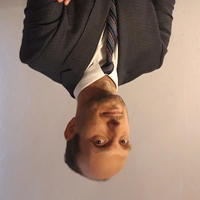Main Page » People » ANS Members »
University Professor Daniel Kikoła
+48 22 234 58 51
Physics Building 117B
http://www.if.pw.edu.pl/~kikola
Consultations
- Mondays 12 - 13
- Fridays 12- 13
Classes
-
Fizyka I
[Physics I] -
Fizyka II
[Physics II] -
Metody Monte Carlo w radiacyjnej fizyce medycznej
[Monte Carlo methods in radiation medical physics] -
Detekcja promieniowania jądrowego
[Detection of nuclear radiation] -
Laboratorium fizyki i techniki jądrowej
[Laboratory of nuclear physics and technology] -
Laboratorium fizyki medycznej
[Laboratory of medical physics] -
Laboratorium technik jądrowych
[Laboratory of nuclear techniques]
RESEARCH
My main scientific interest so far is the experimental high-energy nuclear physics, and I did most of my research within the STAR experiment, www.star.bnl.gov. STAR at the Relativistic Heavy Ion Collider is a large scientific organization (67 institutions from 13 countries and over 650 collaborators) focused on the study of matter under extreme conditions, where a transition from an ordinary nuclear matter to the state with quark and gluon degrees of freedom, Quark-Gluon Plasma (QGP), is expected. I concentrate on the experiential investigation of the QGP properties using charm and bottom quarks.
Since 2015, I'm involved in the development and promotion of a scientific case for a fixed-target experiment using the LHC beams. As a member of the informal AFTER@LHC study group (http://after.in2p3.fr), I contributed to quantifying opportunities related to using charm and bottom quark as a tool to study of gluon and quark dynamics in proton, and in the Quark-Gluon Plasma.
Besides the fundamental research, I also have a deep interest in applied nuclear science. As a leader of the Applied Nuclear Science Group (www.mitj.fizyka.pw.edu.pl) I coordinate and participate in projects related to nuclear techniques in medicine and industry. These activities include Monte Carlo modeling and developing software tools for radiotherapy, new densitometric techniques and application of muon scattering tomography.
SELECTED PUBLICATIONS
- C. Hadjidakis, D. Kikoła, J.P. Lansberg, L. Massacrier et al, A Fixed-Target Programme at the LHC: Physics Case and Projected Performances for Heavy-Ion, Hadron, Spin and Astroparticle Studies, Physics Reports, arXiv: 1807.00603
- M. Bahmani, D. Kikoła, L. Kosarzewski, A technique to study the elastic and inelastic interaction of quarkonium with hadrons using femtoscopic correlations, European Physical Journal C, 2021, vol. 81, no. 4. DOI:10.1140/epjc/s10052-021-09088-7
- V. Begun, D. Kikoła, V. Voychenko, D. Wielanek, Estimation of the freeze-out parameters reachable in a fixed-target experiment at the CERN Large Hadron Collider, Physical Review C 98 034905 (2018), DOI: 10.1103/PhysRevC.98.034905arXiv: 1806.01303
- STAR Collaboration (L. Adamczyk et al.), Elliptic flow of electrons from heavy-flavor hadron decays in Au+Au collisions at √sNN = 200, 62.4 and 39 GeV, Physical Review C 95, 034907 (2017), DOI: 10.1103/PhysRevC.95.034907arXiv: 1405.6348
- D. Kikoła, L. Yi, S. Esumi, F. Wang, W. Xie, Nonflow 'factorization' and a novel method to disentangle anisotropic flow and nonflow, Physical Review C 86 01490 (2012), DOI: 10.1103/PhysRevC.86.014901arXiv: 1110.4809
- D. Kikoła, G. Odyniec, R. Vogt, Prospects for quarkonia production studies in U + U collisions, Physical Review C 84 054907 (2011), DOI: 10.1103/PhysRevC.84.054907arXiv: 1111.4693
PROFILES
ADDITIONAL INFORMATION
- Head of the Nuclear Physics Laboratory at the Faculty of Physics at WUT
- Leader of the Applied Nuclear Physics Group at the Faculty of Physics, at WUT, www.mitj.fizyka.pw.edu.pl
- Since 2019, An advisor of a project within the Industrial Doctoral Program (Doktorat wdrożeniowy) with an objective to design an early warning system for future nuclear power in Poland, based on a network of automatic spectro-dosimetric detectors. The project is carried out in cooperation with the National Atomic Energy Agency, Poland.
- Advisor of the CAMAC student science club at the Warsaw University of Technology, www.camac.if.pw.edu.pl
Scientific grants
- 2019 – 2023 Primary investigator of National Science Centre, Poland grant Study of quark-gluon matter properties using heavy-quark correlations (grant no. 2018/30/E/ST2/00089)
- 2019 – 2023 Project leader at Warsaw University of Technology of the Horizon 2020 grant
- STRONG-2020: The strong interaction at the frontier of knowledge: fundamental research and applications, https://cordis.europa.eu/project/rcn/223645/factsheet/en
- 2017 – 2021 Project leader at Warsaw University of Technology of the Horizon 2020 Euratom grant CHANCE: Characterization of conditioned nuclear waste for its safe disposal in Europe, http://chance-h2020.eu/en
- 2013 – 2015 Primary investigator of HOMING PLUS/2013-7/8 grant: Getting to the Bottom of Quark-Gluon Plasma: Studies of Partonic Medium Properties with Heavy Quarks, Foundation for Polish Science


